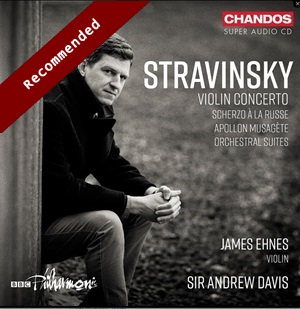
Igor Stravinsky (1882-1971)
Violin Concerto, K. 053 (1930)
Scherzo à la Russe, K. 070 (1945)
Suite No 1 for Small orchestra, K. 045 (1925)
Suite No 2 for Small orchestra, K. 038 (1921)
Apollon Musagète, K. 048 (1927-8 rev. 1947)
James Ehnes (violin), BBC Philharmonic/Andrew Davis
rec. 2023, MediaCity, Salford, Manchester
Chandos SACD CHSA5340 [70]
Among the many masterpieces in Stravinsky’s long career, the Violin Concerto and Apollon Musagète are among the high points of his neoclassical period and both are included here, along with some attractive minor works. I was very taken with Andrew Davis’s previous Stravinsky disc with the two symphonies last year (review), and then asked for more Stravinsky from this team. Now we have some. And I was also impressed by their collaboration with James Ehnes in the Berg Violin Concerto a little earlier (review) so I was pleased to find them collaborating again.
Stravinsky was not a violinist, and when he was invited to write a concerto for the violinist Samuel Dushkin he at first demurred, thinking that he did not know the instrument well enough. However, he was encouraged by the offer of advice from Dushkin together with reassurance from Hindemith, whom he consulted, that Stravinsky’s unfamiliarity with violin technique would not be a disadvantage but rather the reverse. The resulting work is in four movements, with two contrasting Arias between the opening Toccata and the final Capriccio. Although Stravinsky was not deliberately aiming at virtuosity, the solo part is nevertheless surprisingly challenging, with double stops, harmonics, highly chromatic passages and so on, though there are no formal cadenzas. Much of the solo writing is in dialogue with the woodwind, and occasionally even in unison. In this performance, not only does James Ehnes play superbly, but the orchestra’s woodwind players do so also, managing their many tricky passages with aplomb. They also bring to the work the piquancy, wit and also occasional tenderness that it calls for. It sings and dances.
Between this and Apollon Musagète we have some smaller works. The Scherzo à la Russe was written for Paul Whiteman’s jazz band, in which form it was not particularly successful. Stravinsky then rearranged it for a normal orchestra (with clarinets and bassoons replacing saxophones). There is nothing particularly Russian about it, nor is it really a Scherzo, but rather a jolly March with a two trios.
The two Suites for Small Orchestra were orchestrated by Stravinsky from easy piano duets he had written some years earlier for his children. The eight tiny pieces are in various forms, such as a march, a waltz, a polka and so on. However, these are all given a characteristic Stravinskian twist – as it were, cubist portraits of dances. They are charming and, despite their small proportions, not trivial.
Apollon Musagète was a commission from that admirable American patron of the arts, Elizabeth Sprague Coolidge, for a ballet score. Stravinsky chose the subject Apollo and the Muses, reducing their number for this purpose from nine to three. (In the ancient world, there was no fixed number.) He also decided to use an orchestra of strings only. The work is in ten numbers which play continuously, and it gives the lie to those who think Stravinsky cannot write melodically or is not interested in strings. I did wonder whether the strings of the BBC Philharmonic would be able to do this work justice. I needn’t have worried: their playing is serene, lustrous and beautiful. Moreover, Andrew Davis guides them sensitively and securely, shaping the phrases. The ending, in which Apollo leads the Muses off to Parnassus, is quite magical.
This is a splendid disc. This is a SACD, but I was listening on two channel stereo, on which it sounded wonderful: sparkling and clear, with the right amount of resonance. There have been many good recordings of the Violin Concerto, with Grumiaux, Chung and Perlman coming to mind, but Ehnes can hold his own with them. Apollon Musagète is likewise as good as the best, which for me include Chailly and Dutoit. Andrew Davis again shows his deep understanding of the composer. This is a peach of a disc.
Stephen Barber
Help us financially by purchasing from




















